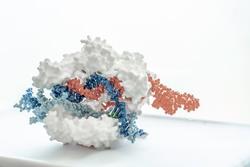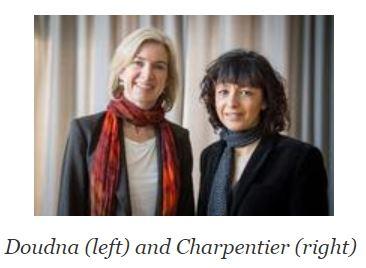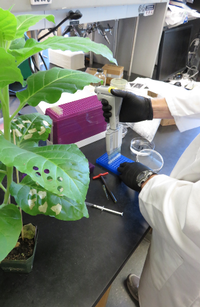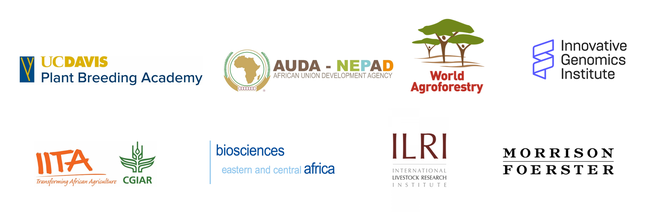
AfPBA CRISPR Course in Gene Editing
The Seed Biotechnology Center at the University of California Davis, together with the Innovative Genomics Institute (IGI) at the University of California, Berkeley, and the International Institute for Tropical Agriculture (IITA) aims to empower 50 to 70 African molecular scientists to implement the latest gene editing technologies to fast-track development of new sources of vital traits in food crops.
What is CRISPR?

CRISPR (an acronym for clustered regularly interspaced short palindromic repeats) refers a gene editing approach that enables specific, directed changes to DNA. CRISPR was the basis for the 2020 Nobel Prize in Chemistry to biochemist Jennifer Doudna of the University of California (UC) Berkeley for her discovery of this precision tool for genome editing, together with French microbiologist Emmanuelle Charpentier. Professor Doudna founded the IGI, a partnership between UC Berkeley and UC San Francisco, to advance genome research for a better world. CRISPR holds huge promise for making desired genetic changes in a precise way, providing another tool to enable plant breeders to rise to the challenges of a changing climate and rapidly growing population at the pace that these demand.
AfPBA CRISPR Course Goal

The goal of the AfPBA CRISPR course is to train molecular scientists engaged in crop improvement, particularly those working in national programs at institutions desiring to implement or initiate gene editing programs.
The course is an intensive 6-week program delivered in three 2-week sessions over a period of a year at World Agroforestry (ICRAF) and at International Livestock Research Institute (ILRI) in Nairobi, Kenya. It focuses on steps to accomplish genome editing from design through validation. Using banana as a model plant, participants formulate targets, design plasmids, perform trait delivery to cells, regenerate plants, and validate results. The course prepares participants to develop key traits (e.g. nutritional content, disease resistance, longer shelf life) in crops aligned to their own national and institutional priorities.
A unique element of this program involves post-graduate mentorship and ongoing support for sustained lab productivity beyond course completion and founding of translational partnerships for commercialization and value chain development.
The course leverages DNA sequence information being amassed by the AOCC on 101 African orphan crops, which include a diversity of vegetable, fruit, nut, legume, oilseed, cereal, and tree species. Furthermore, it emphasizes the role of CRISPR in the overall scheme of cultivar development and in addressing the needs of smallholder farmers, and will support a Community of Practice strongly linked to the disciplines required for product launch, seed distribution, and farmer adoption.
Other key AOCC partners in course delivery are AUDA-NEPAD and Morrison Foerster.
Who should attend?
The course is targeted toward molecular biologists currently engaged in national programs in Africa in institutions that are interested in establishing gene editing research. Priority will be given to those from countries where AfPBA plant breeder alumni are working, as we promote the formation of multi-disciplinary teams in crop improvement. Attendees can be working on any crop.
Thanks to the generous support of our sponsors (including Stephen M. Badger, Bayer, Grantham Foundation, Syngenta, UM6P Ventures affiliated with Mohammed VI Polytechnic University in Morocco), attendees are invited on full scholarship based on applications for each class; class size is limited to 15 participants.
The AfPBA CRISPR program anticipates five cohorts, one each year through 2027. Cohorts 1 and 2 have completed their programs.
The Call for Applications for AfPBA CRISPR Course Class III is now CLOSED. Stay tuned for information on the next class.
AfPBA CRISPR Class III Dates:
- Session 1: Jan 20 – 31, 2025
- Session 2: April 28 – May 9, 2025
- Session 3: Sept 29 – Oct 10, 2025
AfPBA CRISPR Course Instructors and Staff
For more information and funding opportunities,
or contact Dr. Rita Mumm, AOCC Director of Capacity Development and Mobilisation at ritamumm@illinois.edu
AOCC Partners in Delivering the AfPBA CRISPR Course

News and Updates
- UC Davis College of Agricultural and Environmental Sciences announces new course offering of the African Plant Breeding Academy
- Generous Gift from Bayer Will Support Three Participants in the AfPBA CRISPR Course, Class I
- The Future of Plant Breeding in Africa: An Interview with Dr. Rita Mumm



